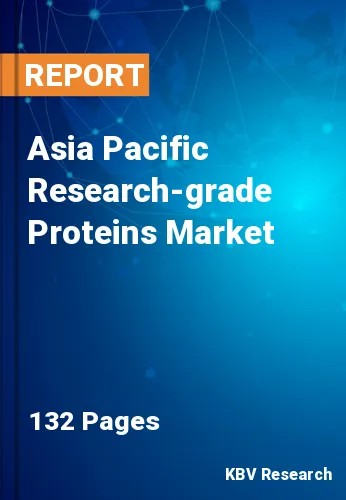The Asia Pacific Research-grade Proteins Market would witness market growth of 16.1% CAGR during the forecast period (2023-2030).
The increasing preference for recombinant proteins over natural proteins in scientific research results from the benefits offered by these proteins. Recombinant proteins, for instance, can be synthesized with a high protein yield, no animal contaminants, and batch-to-batch variation under control. For research applications, recombinant proteins from the growth factor family, such as fibroblast growth factors, vascular endothelial growth factors, and neurotrophins, are frequently used. Increasing use of recombinant proteins in research activities is expected to accelerate the growth of the market over the forecast period.
Sophisticated research and knowledge of drug-targeting mechanisms is essential for drug development. Numerous regions have created biobanks from cohort programs to provide researchers with high-quality samples for redefining treatment strategies. This is expected to culminate in a greater emphasis on biomarker discovery for various diseases. Thus, initiatives and government interest in research activities for better healthcare infrastructure will continue to increase the applications of research-grade proteins, thereby propelling market expansion.
The APAC region is home to numerous prestigious academic and research institutions conducting cutting-edge research in genomics, proteomics, molecular biology, and disease biology. These institutions drive the demand for research-grade proteins. APAC countries, including China, India, South Korea, and Singapore, have grown significantly in their biotechnology and pharmaceutical sectors. These industries heavily rely on these proteins for drug discovery, development, and clinical research. APAC has become a hub for biopharmaceutical manufacturing, with many companies producing biologics, monoclonal antibodies, and biosimilars.
The China region dominated the Asia Pacific Research-grade Proteins Market, by Country in 2022, and would continue to be a dominant market till 2030; thereby, achieving a market value of $171.8 Million by 2030. The Japan market is registering a CAGR of 15.3% during (2023 - 2030). Additionally, The India market would showcase a CAGR of 16.7% during (2023 - 2030).
Based on Host Cell, the market is segmented into Mammalian Cells, Bacterial Cells, Yeast & Fungi, Insect Cells, and Others. Based on Product, the market is segmented into Cytokines & Growth Factors, Immune Checkpoint Proteins, Enzymes, Hormones, Antibodies, Virus Antigens, Recombinant Regulatory Proteins, and Others. Based on End-use, the market is segmented into Pharmaceutical & Biotechnology Companies, Academic & Research Institutes, and Others. Based on countries, the market is segmented into China, Japan, India, South Korea, Singapore, Malaysia, and Rest of Asia Pacific.
Free Valuable Insights: The Global Research-grade Proteins Market is Predict to reach $2.5 Billion by 2030, at a CAGR of 15.2%
The market research report covers the analysis of key stake holders of the market. Key companies profiled in the report include Thermo Fisher Scientific, Inc., Abcam Plc, Miltenyi Biotech B.V. & Co. KG, Genscript Biotech Corporation, Bio-Techne Corporation, Proteintech Group, Inc., AcroBiosystems INC., Sino Biologicals, Inc. and ProSpec-Tany TechnoGene Ltd. and New England Biolabs, Inc.
By Host Cell
By Product
By End-use
By Country
Our team of dedicated experts can provide you with attractive expansion opportunities for your business.

